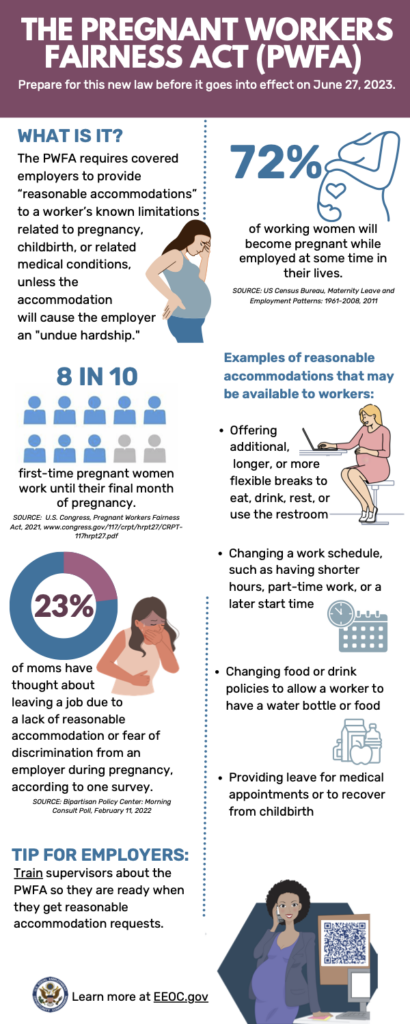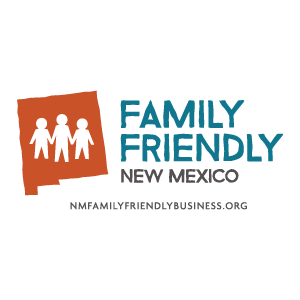This blog post is a summary of the Virtual Workshop hosted by FFNM: NEW Federal Protections for Pregnant and Breastfeeding Employees. It will cover the Pregnant Workers Fairness Act (PWFA). Please see this link to view the summary and overview of the PUMP Act portion of the workshop. A special thanks to Tracy McDaniel, MPH, Policy Advocate at the Southwest Women’s Law Center for contributing to the workshop and this blog post!
Now more than ever before, people are working throughout pregnancy and returning to work soon after giving birth. Nationally, 72% of women become pregnant while employed at some point in their lives, 80% of women work through the final month of their first pregnancy, and one in four new mothers returns to work just ten days after giving birth. Pregnancy, giving birth, and raising an infant put an additional financial strain on the household budget, and working during pregnancy is an economic necessity for the economic security for most New Mexico families.Businesses also benefit from ensuring that pregnant workers have the support they need. Currently, with low unemployment and high turnover rates, many businesses are struggling to find and retain workers. At the same time, fewer than half of NM women are currently participating in the workforce. Nationally, at least 30% of mothers of young children are not participating in the workforce. By providing appropriate support for workers before, during, and after pregnancy, businesses can increase the number of available workers and retain valuable and skilled employees.
Too many women are leaving the workforce during pregnancy or around the time of birth when simple accommodations could protect their health and safety while improving productivity in their workplaces. The PWFA can help to bridge this gap.
PWFA Key Points
- Will take effect on June 27, 2023
- Requires covered employers to provide “reasonable accommodations” to a worker’s known limitations related to pregnancy, childbirth, or related medical conditions
- Employers should have a good-faith conversation with a worker seeking reasonable accommodations about the worker’s needs and reasonable accommodations that could meet those needs
- Accommodations are limited and cannot cause the employer “undue hardship”
- Similar to the Pregnant Worker Accommodation Act (PWA), passed in NM in 2020 (with one important difference)
Pregnant women still face discrimination and difficulty getting accommodation in the workplace. Until now, federal protections for pregnant workers and employees with new babies have been very limited. In 1978, the Pregnancy Discrimination Act was passed. This act is mostly relevant to hiring, promotion, and other employment decisions. It does not create any additional protections for pregnant women related to their work duties or conditions. Pregnancy is not considered a disability under the Americans with Disabilities Act. – That’s because it is not a disability. We don’t want pregnancy to be considered a disability, but we also need to acknowledge that pregnant workers may have unique needs in the workplace.
PWFA – What is a reasonable accommodation?
Reasonable accommodations are changes to the work environment or the ways things are typically done at work. Examples of accommodations under the PWFA include:
- More frequent bathroom breaks
- Water/snacks
- A closer parking space
- Changes to work shifts
- A chair or footstool at a work station
- Appropriately sized uniforms/PPE/safety gear
- Reprieve from heavy lifting/light duty
- Leave for prenatal appointments
Qualified employees/covered employers:
- “Qualified employee” – an employee or applicant of a covered employer who, with or without reasonable accommodation, can perform the essential functions of the position, with specified exceptions.
- ”Covered employers” include private and public sector employers with at least 15 employees,* Congress, Federal agencies, employment agencies, and labor organizations.
- The PWFA does not replace federal, state, or local laws that are more protective of workers affected by pregnancy, childbirth, or related medical conditions. With that being said, New Mexico employers with five or more employees will need to comply with the Pregnant Worker Fairness Act (PWFA).
*In New Mexico, employers with five or more employees will need to comply.
The Pregnant Worker Fairness Act and the NM Pregnant Worker Accommodation Act, which was passed in 2020, are very simple in design and are meant to help pregnant people stay employed and help employers understand how they can best accommodate the needs of their pregnant employees.
PWFA – What is undue hardship?
- Undue hardships would cause significant difficulty or expense to the employer.
- Would need to be proved in court
- Determined on a case-by-case basis
- “Undue hardship” cases are easier for smaller employers with fewer resources
- If an accommodation poses an undue hardship, the employer must identify another accommodation that would pose less hardship
- An individual with a needed accommodation may be given the option of paying a portion of the cost which would create an undue hardship
PWFA – Rules for employers
Covered employers cannot:
- Require an employee to accept an accommodation without a discussion about the accommodation between the worker and the employer;
- Deny a job or other employment opportunities to a qualified employee or applicant based on the person’s need for a reasonable accommodation;
- Require an employee to take leave if another reasonable accommodation can be provided that would let the employee keep working;
- Retaliate against an individual for reporting discrimination or exercising rights set forth by PWFA; or
- Interfere with any individual’s rights under the PWFA.
In NM, complaints can be filed with the NM Department of Workforce Solutions Human Rights Bureau
What should I do?
- Ensure that supervisors receive training about PWFA and reasonable accommodations
- Ensure that all employees have access to information about their rights (including posting NMDWS posters in breakroom)
- Encourage open communications with your employees and be open to working together on mutually-beneficial solutions
- Have questions? Southwest Women’s Law Center staff attorney can answer questions related to PWA/PWFA and reasonable accommodations.
- Phone: 505-244-0502
- Email: info@swwomenslaw.org
Additional Workshop Resources
 Tracy McDaniel, MPH, serves as Policy Advocate at Southwest Women’s Law Center, where she focuses on policies that ensure economic stability for NM women and families, including work on the passage of the Pregnant Worker Accommodation Act in New Mexico in 2020. Current policy initiatives include advocacy on the Paid Family & Medical Leave Act and child care reform. Her past professional experience has focused on early childhood development, health promotion, birth work, lactation support, and working with survivors of sexual and intimate partner violence. She holds a BA in Psychology and Women’s Studies from Miami University, a graduate certificate in Maternal Child Health Epidemiology from University of Arizona, and a Master of Public Health degree from University of New Mexico.
Tracy McDaniel, MPH, serves as Policy Advocate at Southwest Women’s Law Center, where she focuses on policies that ensure economic stability for NM women and families, including work on the passage of the Pregnant Worker Accommodation Act in New Mexico in 2020. Current policy initiatives include advocacy on the Paid Family & Medical Leave Act and child care reform. Her past professional experience has focused on early childhood development, health promotion, birth work, lactation support, and working with survivors of sexual and intimate partner violence. She holds a BA in Psychology and Women’s Studies from Miami University, a graduate certificate in Maternal Child Health Epidemiology from University of Arizona, and a Master of Public Health degree from University of New Mexico.


